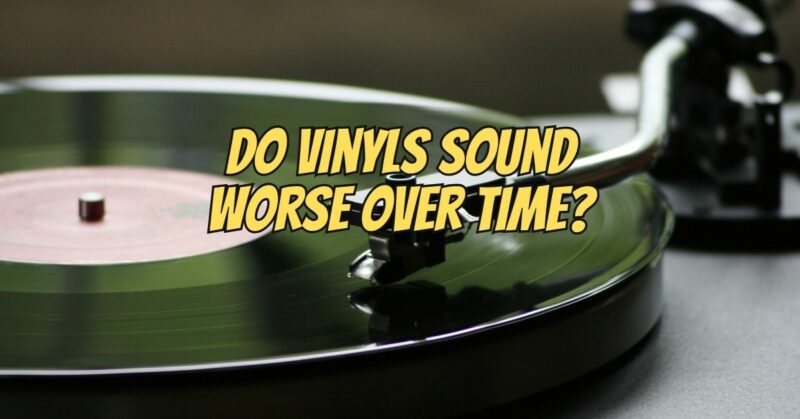Vinyl records can degrade and deteriorate over time, potentially leading to a decline in sound quality if they are not properly cared for and stored. Several factors can contribute to the degradation of vinyl records:
Physical Wear and Tear: Repeated playbacks can cause physical wear on the vinyl surface. Over time, the stylus (needle) can create grooves in the record’s surface, which may lead to increased surface noise and reduced audio fidelity.
Dust and Dirt: Dust and dirt particles that accumulate on the record’s surface can interfere with playback and cause surface noise. Regular cleaning is essential to maintain sound quality.
Mold and Mildew: Improper storage in humid or damp conditions can lead to mold and mildew growth on the vinyl surface. This can damage the grooves and affect playback.
Scratches and Scuffs: Physical damage in the form of scratches and scuffs can significantly impact sound quality. Deep scratches, in particular, may cause skips or distortion during playback.
Warping: Vinyl records can warp over time, especially if exposed to heat or direct sunlight. Warped records may cause tracking and playback problems.
Storage Conditions: Proper storage conditions are crucial for preserving vinyl records. Records should be stored vertically in a cool, dry place, away from direct sunlight and extreme temperatures.
Stylus Wear: The stylus of the turntable’s cartridge can wear down over time, affecting playback quality. Regular stylus replacement is essential to maintain sound quality.
Quality of Pressing: The quality of the vinyl pressing itself can vary. High-quality pressings tend to have better sound quality and durability.
To mitigate the degradation of vinyl records, it’s essential to take proper care of them. Here are some tips for preserving the sound quality of your vinyl collection:
Clean Records: Use a carbon fiber or anti-static brush to remove dust before each playback. Deep-clean records periodically using a record cleaning machine or a gentle cleaning solution.
Handle Records Carefully: Handle records by their edges to avoid touching the grooved surface. Fingerprints and oils can affect playback.
Store Records Properly: Store records vertically in sturdy, acid-free sleeves and jackets. Keep them in a cool, dry, and stable environment, away from direct sunlight and extreme temperatures.
Use a High-Quality Stylus: Invest in a high-quality stylus for your turntable, and replace it when it shows signs of wear.
Inspect Records: Regularly inspect your records for visible damage and address any issues promptly.
Avoid Overplaying: Limit the number of playbacks for each record to minimize wear.
While vinyl records can deteriorate over time, proper care and maintenance can help preserve their sound quality and longevity. Regular cleaning and careful handling are essential practices for vinyl collectors to enjoy their records for years to come.


